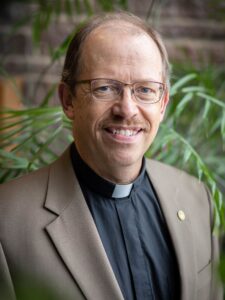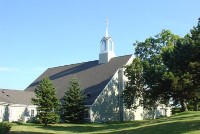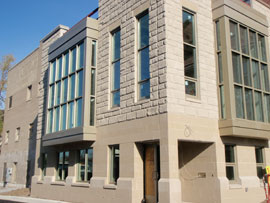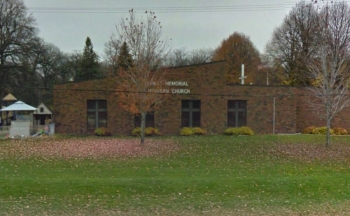 By Pastor John Hulden
By Pastor John Hulden
I witnessed two baptisms last Sunday. Thanks to Edina Community and Oak Grove Lutheran churches for the privilege of joining you in welcoming two adorable babies, Isaac and Gordon, to “the body of Christ and the mission we share.”
Water and the Word: Promises are made by parents and by sponsors and by the church family; and a bigger promise from God. Baptism is simple and deep. Water is life: It sustains and washes us. Water is death: Our sinful self is drowned. Water and the Word is death into life: We rise up out of the water to a new life in Christ.
“We got simple, … and simple made us go deep.”
Throughout the millennia human beings have walked on this little blue ball spinning around the minor star we call the sun, humans have only settled down and stayed where there was water. After humans found community with one another near the water, most every tribe and nation made some sort of bread for sustenance and some sort of wine for celebration. No wonder Jesus started us with two simple sacraments, … with stuff that is readily available whenever we get together. Keep it simple.
The Minneapolis Star newspaper in 1938 was one of the first, if not the first, to publish a story on K.I.S.S.: “Keep it short and simple.” (Thanks, Wikipedia.) Although I don’t know about you, I always heard it as “Keep it Simple Stupid” — probably from my dad. The KISS principle has been an effective design tool for quite some time.
Does the KISS principle apply to what we do as church? As followers of Jesus?
WE CAN EXPERIENCE the joy of a baptism, the deep meaning of going up with empty hands to receive the bread and wine, … and, at the same time, worry about lower attendance numbers and church budgets fraught with unknowns. When I was a kid, my parents — and my friends’ parents — didn’t have many societal options on Sunday mornings, … or Wednesday evenings, either. Today when folks show up at worship, they might be turning down a myriad of other events tugging at their calendars and to-do lists. Yet folks still show up to church for splashing water, breaking bread, and wine poured … for you and me.
“The KISS principle has been an effective design tool for quite some time.”
Perhaps keeping it simple is a way forward.
These last two years Nick Tangen, Maya Bryant, and I have been walking with leaders of a dozen congregations as we learn together what it means to work on Faith Practices and Neighboring Practices (FPNP). As leaders, we started out a little too complicated. … Then we got simple, … and simple made us go deep. KISS.
AS SOME OF YOU might know, I love reading church newsletters. Here are some excerpts from three church newsletters. Pastors in Faith Practices and Neighboring Practices (FPNP) wrote about what they were learning, … keeping it simple.
Pastor Jason Wahlstrom, Holy Nativity Lutheran, New Hope (July 2022)
“Our team has been hard at work learning new faith practices and ways that we can better connect with our neighbors. This summer we are engaging in a summer listening campaign, a way that we can listen to our neighbors and get to know them better. We have chosen the families in our Holy Nativity Christian Child Care Center as a group we would like to know better. One of the things we have had to wrap our minds around, however, is that we are doing this simply for the sake of knowing our neighbors better. There is no ulterior motive. We are not asking anything of those we are listening to. We have no expectations. We simply desire to know them better. At first, this seemed kind of confusing, as simple as it sounds. This is because we have been trained to believe that any “program” of the church should have a purpose. It should have goals. We should be able to measure success. That is not the case for this effort, and it has been hard for us to let go of those old ideas.
we can listen to our neighbors and get to know them better. We have chosen the families in our Holy Nativity Christian Child Care Center as a group we would like to know better. One of the things we have had to wrap our minds around, however, is that we are doing this simply for the sake of knowing our neighbors better. There is no ulterior motive. We are not asking anything of those we are listening to. We have no expectations. We simply desire to know them better. At first, this seemed kind of confusing, as simple as it sounds. This is because we have been trained to believe that any “program” of the church should have a purpose. It should have goals. We should be able to measure success. That is not the case for this effort, and it has been hard for us to let go of those old ideas.
“For so long, the church has believed that success or failure could be measured. This has usually been done by measuring average weekly worship attendance. For whatever reason, that number was the be all and end all of success or failure. I believe that can no longer be the sole measurement tool when it comes to success of the church. The relationships we build with each other and with our neighbors is perhaps a much more important measurement. But perhaps we shouldn’t be measuring at all. When we focus too much of our energy on worrying about whether something was a success or whether it was worth it or not, we lose track of what is important. If we strengthened our relationship with one person, with one neighbor, then that is enough.”
Pastor Rhonda Hlavinka, Salem English Lutheran, Minneapolis (May-June 2023)
“At first, we just practiced breathing and silence — because our world is not all that conducive to either. Then we practiced lectio divina — listening to scripture and prayer of all kinds. We practiced listening, storytelling, and listening to stories. We practiced asking good questions and answering good questions. We practiced cultural competency, disrupting racism, and organizing. We practiced spiritual direction and being community. We practiced recognizing toxic charity, abundance, asset mapping, and dreaming. We practiced a lot of things. …
practiced listening, storytelling, and listening to stories. We practiced asking good questions and answering good questions. We practiced cultural competency, disrupting racism, and organizing. We practiced spiritual direction and being community. We practiced recognizing toxic charity, abundance, asset mapping, and dreaming. We practiced a lot of things. …
“I will not say that ‘practice makes perfect,’ … that’s just not true. But perfect isn’t what we are reaching for. Last Sunday the reach was to make a visitor feel welcomed and valued, … and because of all the practicing this community has done, you did it masterfully.
“We are going to be doing some practicing together in the months ahead. … [A]nd if some of it feels counter-cultural, I assure you it is. But it is also good. These practices are all based in exactly what I saw happen on Sunday in church, … being present, paying attention, listening, holding space, and welcoming.
“Practice has made you great at community and welcome. I look forward to practicing more of this with you.”
Pastor Ryan Fletcher, Christ Memorial Lutheran, Plymouth (May 2023)
“Over the past two years, a team of leaders at Christ Memorial has been learning about listening to the Spirit through the synods Faith Practices and Neighboring Practices program. My hope and expectation is that we will continue to use these practices in the years ahead. Finding ways to listen more deeply to one another and to our neighbors allows the Spirit to build up and renew our community. …. Nick Tangen offers three simple questions that church communities can begin to use not only in planning meetings but also in simple conversations with community members new and old. These are the questions:
expectation is that we will continue to use these practices in the years ahead. Finding ways to listen more deeply to one another and to our neighbors allows the Spirit to build up and renew our community. …. Nick Tangen offers three simple questions that church communities can begin to use not only in planning meetings but also in simple conversations with community members new and old. These are the questions:
- What are a few things you do well enough that you could teach someone else?
- What are some things you want to learn that you don’t know about now?
- Is there anyone else in the community whose gifts you really appreciate?
“Notice the intention behind each of these questions. The first question identifies a person’s gifts. The second question invites curiosity and the possibility of connecting people to the gifts of the community in the future. The third question helps name people to connect with for follow-up conversations and further listening. …
“Our time in the FPNP program is coming to an end, but these life-giving practices of listening to the Spirit speak through the community have only just begun.”

